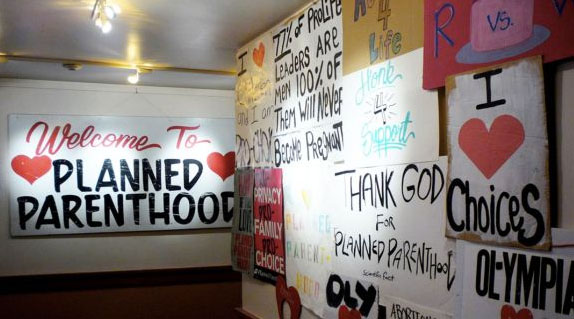
At the end of July, the first outbreak of the Zika virus occurred in Miami, FL -- confirming many experts’ fears that it was only a matter of time before the mosquito-borne virus began to impact the United States. But efforts to fight the spread of the virus have been stymied by anti-choice lawmakers’ reliance on the right-wing media talking point that Planned Parenthood isn’t an essential service provider.
Since last winter, the Zika virus has spread among a number of Latin American countries, predominantly affecting pregnant persons. Experts have classified the virus as a “public health threat” due to the suspected link between Zika and the neurological disorder microcephaly, which severely stunts the development of a fetus during pregnancy. This link prompted concerns about the accessibility of contraception, prenatal care, and abortion for pregnant persons affected by Zika in Latin America.
Rather than prepare for an outbreak of Zika in the United States by making these essential reproductive health services more accessible, however, anti-choice lawmakers instead invoked a right-wing media myth to attack Planned Parenthood and block its efforts to help combat a potential outbreak.
Since the release of deceptively edited videos from the discredited Center for Medical Progress, anti-choice legislators have repeated misinformation about Planned Parenthood and the essential services it provides as part of an ongoing attempt to defund the organization. To justify these attacks, legislators have relied on the right-wing media talking point that community health clinics can effectively fill the gap left by denying Planned Parenthood access to funding and resources.
Prior to the Zika outbreak, anti-choice lawmakers in Florida had already attempted to block access to abortion and other reproductive health services offered by Planned Parenthood.
In March, Florida’s Republican Gov. Rick Scott signed a bill that not only emulated provisions of Texas’ unconstitutional HB 2, but also barred Planned Parenthood from accessing state Medicaid funds. Although parts of the law have been temporarily blocked by a federal judge, if enforced in full the bill would functionally defund the reproductive care provider. The Guardian’s Jennifer Gerson Uffalussy reported that supporters of the Florida bill echoed right-wing media’s false claim that community health clinics could fill in by “insist[ing] that plentiful alternatives exist for reproductive and sexual healthcare” even without Planned Parenthood.
However, as Slate’s Christina Cauterucci explained, the list of replacement providers in the state was “laughable” because it was filled with “dozens of elementary and middle schools, several dental practices, and at least one optometry center.” She continued:
Nevertheless, proponents of HB 1411 have used this list to pooh-pooh concerns for women’s health, claiming that there are 29 public health clinics for every Planned Parenthood in the state; therefore, the argument goes, no poor women will miss Planned Parenthood when it’s gone. The Guardian reports that in 2010, according to Guttmacher Institute data, there were just five public health clinics that offered family planning services for every Florida Planned Parenthood.
Indeed, experts have confirmed that the idea of community clinics filling in for Planned Parenthood is “a gross misrepresentation of what even the best community health centers in the country would be able to do.” According to earlier research from the Guttmacher Institute, in 103 U.S. counties, Planned Parenthood is the only “safety-net health center” accessible for those seeking contraception. Guttmacher noted that Planned Parenthood is a leading provider of publicly subsidized contraceptive services and typically can see more patients annually for these services than “other types of safety-net providers” can.
Access to contraception and abortion care are essential to address the spread of Zika in the United States. As Emma Grey Ellis wrote in an August 2 article for Wired, “To actually combat Zika, you need to gain control of its vectors.” She continued that although enabling people “to delay pregnancy to avoid passing Zika to their children is an obvious, vital step,” there were a number of “political stumbling blocks” preventing access to reproductive health services.
These “stumbling blocks” have included opposition from public officials. During an August 6 interview with Politico, former Republican presidential candidate Sen. Marco Rubio (R-FL) said he believed those impacted by Zika should not have the option to abort the pregnancy.Gov. Scott has urged pregnant people to “contact your OB-GYN for guidance to and receive a Zika prevention kit.”
However, according to Mother Jones, “Planned Parenthood hasn't received any Zika kits from the Florida Department of Health, nor has it received any guidance from the department about how to serve pregnant women during a possible outbreak.” The outlet noted that this failure is problematic given the significant role Planned Parenthood plays in caring for low-income and uninsured patients, who are “more likely to get pregnant by accident.”
Furthermore, even when pregnancies are intentional, the threat posed by Zika is still substantial. In an article for The Atlantic, journalist Liz Tracy reported on her fraught experience being pregnant in Miami during the Zika outbreak. She wrote that the threat of Zika transformed “nine-and-a-half months into a horror movie with a monster that is almost impossible to locate and hard to avoid.” As Tracy explained, thanks to the numerous barriers to abortion access, “if a Zika infection terribly damaged the fetus, and we decided on having an abortion, those restrictive laws would pose an overwhelming emotional, practical, and financial challenge.”
Tracy also quoted another pregnant woman saying that with the lack of testing, kits, and care in Florida, “It just feels like too little too late” to contain Zika in the state. She added, “It’s crazy how much they could have done in advance and nothing was done.”